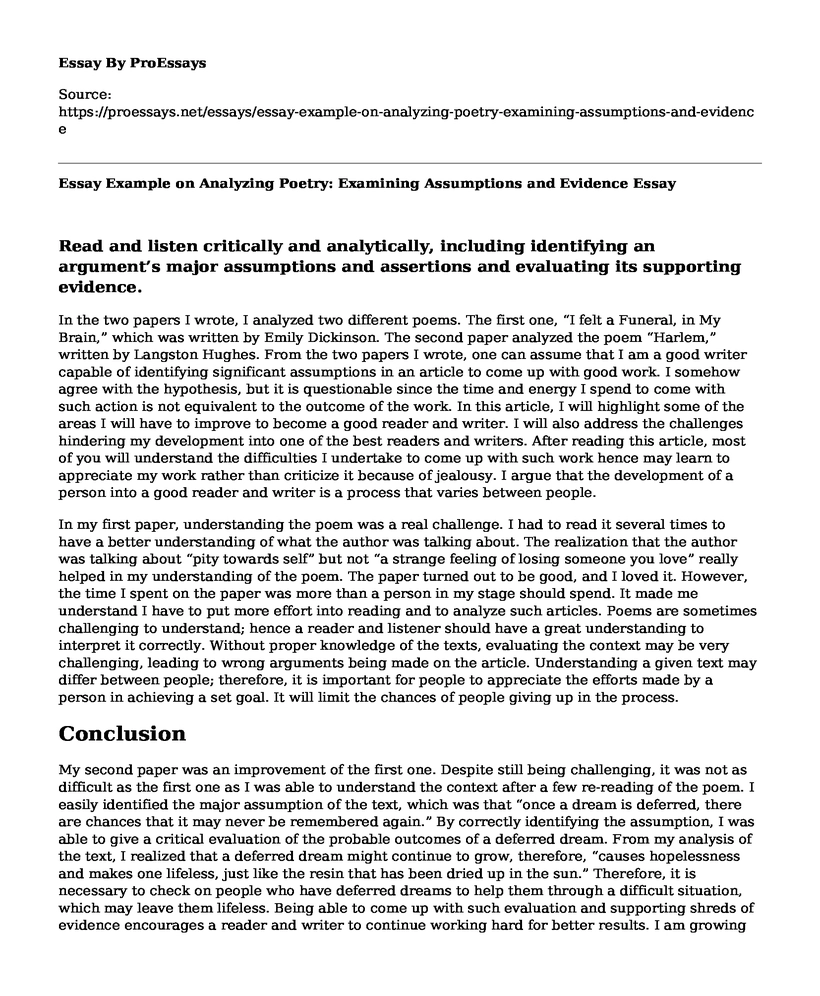Read and listen critically and analytically, including identifying an argument’s major assumptions and assertions and evaluating its supporting evidence.
In the two papers I wrote, I analyzed two different poems. The first one, “I felt a Funeral, in My Brain,” which was written by Emily Dickinson. The second paper analyzed the poem “Harlem,” written by Langston Hughes. From the two papers I wrote, one can assume that I am a good writer capable of identifying significant assumptions in an article to come up with good work. I somehow agree with the hypothesis, but it is questionable since the time and energy I spend to come with such action is not equivalent to the outcome of the work. In this article, I will highlight some of the areas I will have to improve to become a good reader and writer. I will also address the challenges hindering my development into one of the best readers and writers. After reading this article, most of you will understand the difficulties I undertake to come up with such work hence may learn to appreciate my work rather than criticize it because of jealousy. I argue that the development of a person into a good reader and writer is a process that varies between people.
In my first paper, understanding the poem was a real challenge. I had to read it several times to have a better understanding of what the author was talking about. The realization that the author was talking about “pity towards self” but not “a strange feeling of losing someone you love” really helped in my understanding of the poem. The paper turned out to be good, and I loved it. However, the time I spent on the paper was more than a person in my stage should spend. It made me understand I have to put more effort into reading and to analyze such articles. Poems are sometimes challenging to understand; hence a reader and listener should have a great understanding to interpret it correctly. Without proper knowledge of the texts, evaluating the context may be very challenging, leading to wrong arguments being made on the article. Understanding a given text may differ between people; therefore, it is important for people to appreciate the efforts made by a person in achieving a set goal. It will limit the chances of people giving up in the process.
Conclusion
My second paper was an improvement of the first one. Despite still being challenging, it was not as difficult as the first one as I was able to understand the context after a few re-reading of the poem. I easily identified the major assumption of the text, which was that “once a dream is deferred, there are chances that it may never be remembered again.” By correctly identifying the assumption, I was able to give a critical evaluation of the probable outcomes of a deferred dream. From my analysis of the text, I realized that a deferred dream might continue to grow, therefore, “causes hopelessness and makes one lifeless, just like the resin that has been dried up in the sun.” Therefore, it is necessary to check on people who have deferred dreams to help them through a difficult situation, which may leave them lifeless. Being able to come up with such evaluation and supporting shreds of evidence encourages a reader and writer to continue working hard for better results. I am growing as a reader and a writer, it may take a longer time, but the results will be worth celebrating.
References
Dickinson, E. (1960). I felt a funeral in my brain. Complete Poems of Emily Dickinson. Boston: Little, Brown & Co. https://www.saylor.org/courses/engl405/
Hughes, L. (1990). Harlem by Langston Hughes [Video]. Poetry Foundation. https://www.poetryfoundation.org/poems/46548/harlem
Cite this page
Essay Example on Analyzing Poetry: Examining Assumptions and Evidence. (2023, Aug 08). Retrieved from https://proessays.net/essays/essay-example-on-analyzing-poetry-examining-assumptions-and-evidence
If you are the original author of this essay and no longer wish to have it published on the ProEssays website, please click below to request its removal:
- To Kill a Mockingbird: Metaphor Analysis Essay
- Literary Analysis Essay on Huxley's Brave New World
- If I Should Have a Daughter by Sarah Kay Poetry Analysis Essay
- Literature Analysis Essay on "Love's Labor's Lost"
- Research Paper on Eliot's Establishment of Modern Heritage
- Dreams Postponed: A Reflection on Harlem Life
- Paper Example on A Remarkable Discovery: April May's Encounter With The Alien Carl







